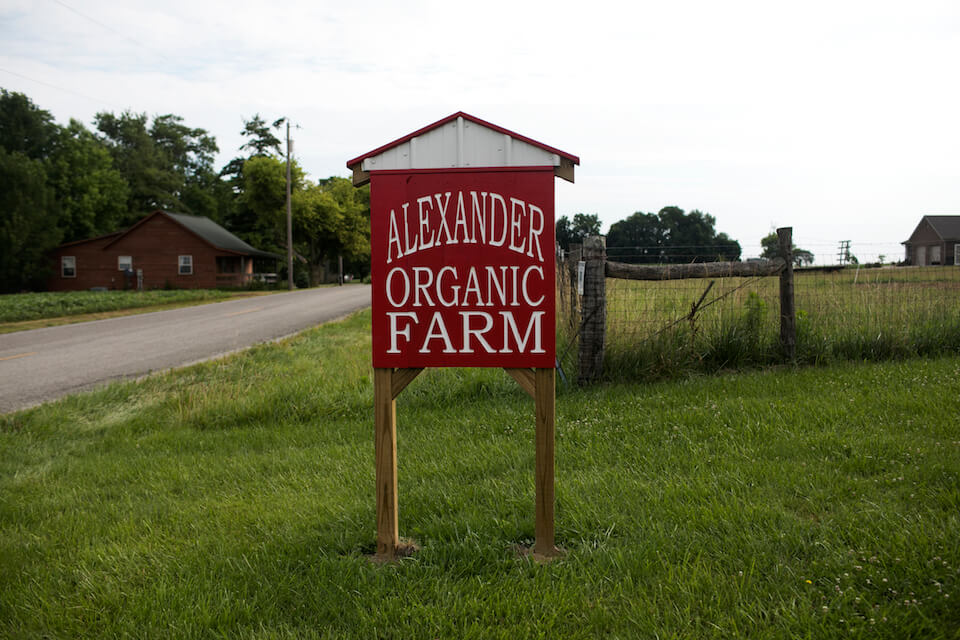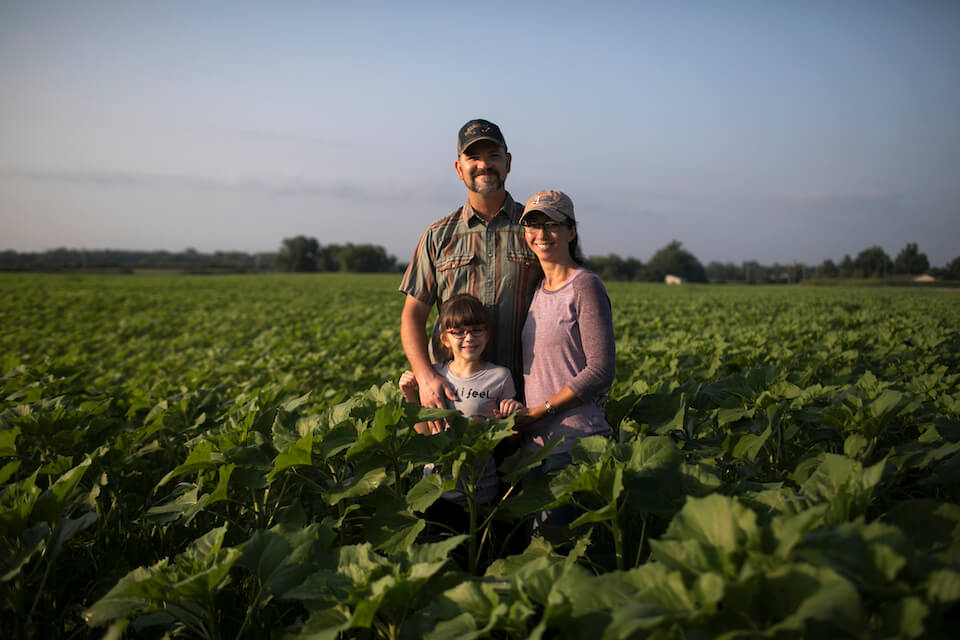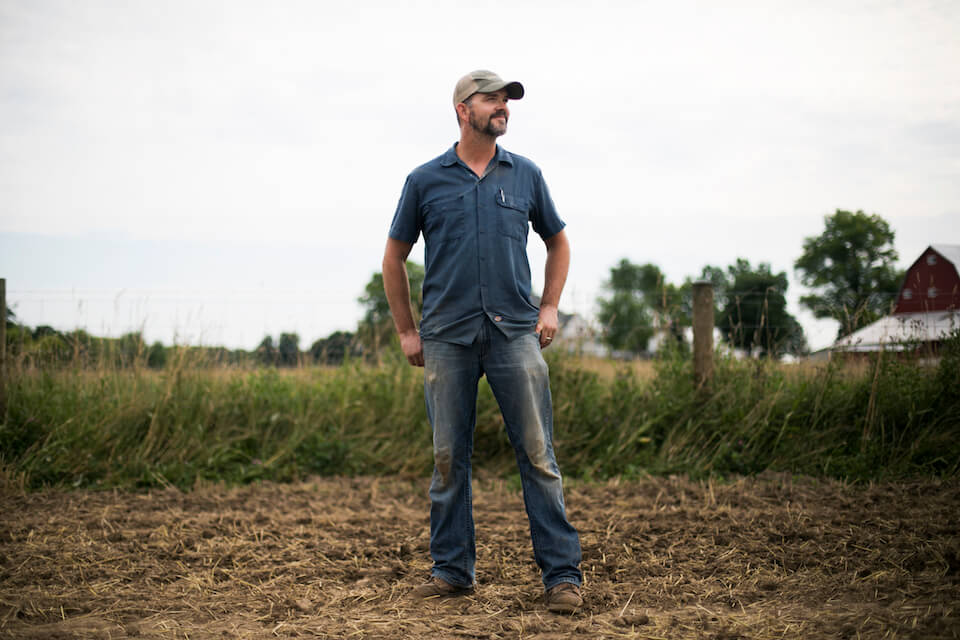Meet the Modern Farmer: Ryan Alexander of Alexander Farms
A former musician shows his Corn Belt neighbors that organic is an option.
After a couple of years balancing a grueling tour schedule with a full-time job, Ryan was ready to settle down. His 30s were quickly approaching, and he’d also fallen in love with the sister of the Tsybil’s drummer, a woman named Melissa Chapple. “When Melissa and I started taking about getting married and having kids, we got to dreaming about going back to the farm,” he says. “Next thing you know, we’re doing more than dreaming.”

The couple moved home in 2007, right about the time that Ryan’s father, Stewart, began considering retirement. Though Stewart had been running a conventional corn and hog operation, going organic had always seemed like a worthwhile challenge. Ryan and Melissa took the reins and decided to give it a shot.
The first step? Repairing the soil through the use of cover crops, specifically a hay mix of orchard grass and legumes that help smother weeds and put nitrogen back in the ground. The new farmers started small, devoting about 40 of their 200 acres to the effort. Three years later – that’s the transition period required for organic certification – the couple produced their first certified corn crop. That year, they also welcomed their first child, Violet.
It took seven years to certify all 200 acres. Ryan rotates corn, soybeans, oats, hay, winter wheat, and radishes through his fields, and also raises cattle and poultry (and occasionally, hogs), too. The crops and livestock choices are meant to compliment each other, and the family sees to it that nearly everything produced on the farm is somehow put to use. For example, those cover crops do more than restore the soil – they also help to feed the animals, whose manure, in turn, helps fertilize the fields. The Alexanders are hoping to be an example for their community. “We’re in the middle of conventional corn country, we’re on display,” Ryan explains. “If we can stay in business and show our neighbors that this a viable option, that’s the biggest accomplishment that I could ask for.”
Last summer, the Alexanders were approached with an enticing proposition – a new natural beauty start-up called Seed Phytonutrients was looking for a partner to grow sunflowers to provide sunflower seed oil for their products. Melissa had already been growing the plants around their property to attract pollinators and provide seed for their poultry feed, so they were excited to add the crop to their rotation. Sunflowers have large taproots, which help counter soil compaction, while their height and broad leaves help shade out weeds that would otherwise need to be managed. They’re also a hardy crop that can go in later in the season, which can potentially mean doubling the land’s usage.
“We had a field of wheat that was looking good to mature earlier than usual,” Ryan says. “We were able to harvest that, prepare the soil bed, and get the sunflowers planted in early July.”

An unusually wet autumn delayed what would have typically been an early-fall harvest until November, but overall, the crop was a success. When a gamble like this pays off, it means a lot to the Alexanders – and not just financially. Ryan sees it as a chance to help change the idea of what farming in Ohio can look like. “We’re kind of the lunatic fringe people around here,” he admits. “But someone needs to be the example. Everybody wants somebody else to jump into the water to see if they float.”
Follow us

This work is licensed under a Creative Commons Attribution-NoDerivatives 4.0 International License.
Want to republish a Modern Farmer story?
We are happy for Modern Farmer stories to be shared, and encourage you to republish our articles for your audience. When doing so, we ask that you follow these guidelines:
Please credit us and our writers
For the author byline, please use “Author Name, Modern Farmer.” At the top of our stories, if on the web, please include this text and link: “This story was originally published by Modern Farmer.”
Please make sure to include a link back to either our home page or the article URL.
At the bottom of the story, please include the following text:
“Modern Farmer is a nonprofit initiative dedicated to raising awareness and catalyzing action at the intersection of food, agriculture, and society. Read more at <link>Modern Farmer</link>.”
Use our widget
We’d like to be able to track our stories, so we ask that if you republish our content, you do so using our widget (located on the left hand side of the article). The HTML code has a built-in tracker that tells us the data and domain where the story was published, as well as view counts.
Check the image requirements
It’s your responsibility to confirm you're licensed to republish images in our articles. Some images, such as those from commercial providers, don't allow their images to be republished without permission or payment. Copyright terms are generally listed in the image caption and attribution. You are welcome to omit our images or substitute with your own. Charts and interactive graphics follow the same rules.
Don’t change too much. Or, ask us first.
Articles must be republished in their entirety. It’s okay to change references to time (“today” to “yesterday”) or location (“Iowa City, IA” to “here”). But please keep everything else the same.
If you feel strongly that a more material edit needs to be made, get in touch with us at [email protected]. We’re happy to discuss it with the original author, but we must have prior approval for changes before publication.
Special cases
Extracts. You may run the first few lines or paragraphs of the article and then say: “Read the full article at Modern Farmer” with a link back to the original article.
Quotes. You may quote authors provided you include a link back to the article URL.
Translations. These require writer approval. To inquire about translation of a Modern Farmer article, contact us at [email protected]
Signed consent / copyright release forms. These are not required, provided you are following these guidelines.
Print. Articles can be republished in print under these same rules, with the exception that you do not need to include the links.
Tag us
When sharing the story on social media, please tag us using the following: - Twitter (@ModFarm) - Facebook (@ModernFarmerMedia) - Instagram (@modfarm)
Use our content respectfully
Modern Farmer is a nonprofit and as such we share our content for free and in good faith in order to reach new audiences. Respectfully,
No selling ads against our stories. It’s okay to put our stories on pages with ads.
Don’t republish our material wholesale, or automatically; you need to select stories to be republished individually.
You have no rights to sell, license, syndicate, or otherwise represent yourself as the authorized owner of our material to any third parties. This means that you cannot actively publish or submit our work for syndication to third party platforms or apps like Apple News or Google News. We understand that publishers cannot fully control when certain third parties automatically summarize or crawl content from publishers’ own sites.
Keep in touch
We want to hear from you if you love Modern Farmer content, have a collaboration idea, or anything else to share. As a nonprofit outlet, we work in service of our community and are always open to comments, feedback, and ideas. Contact us at [email protected].by Modern Farmer, Modern Farmer
February 5, 2018
Modern Farmer Weekly
Solutions Hub
Innovations, ideas and inspiration. Actionable solutions for a resilient food system.
ExploreExplore other topics
Share With Us
We want to hear from Modern Farmer readers who have thoughtful commentary, actionable solutions, or helpful ideas to share.
SubmitNecessary cookies are absolutely essential for the website to function properly. This category only includes cookies that ensures basic functionalities and security features of the website. These cookies do not store any personal information.
Any cookies that may not be particularly necessary for the website to function and are used specifically to collect user personal data via analytics, ads, other embedded contents are termed as non-necessary cookies.
